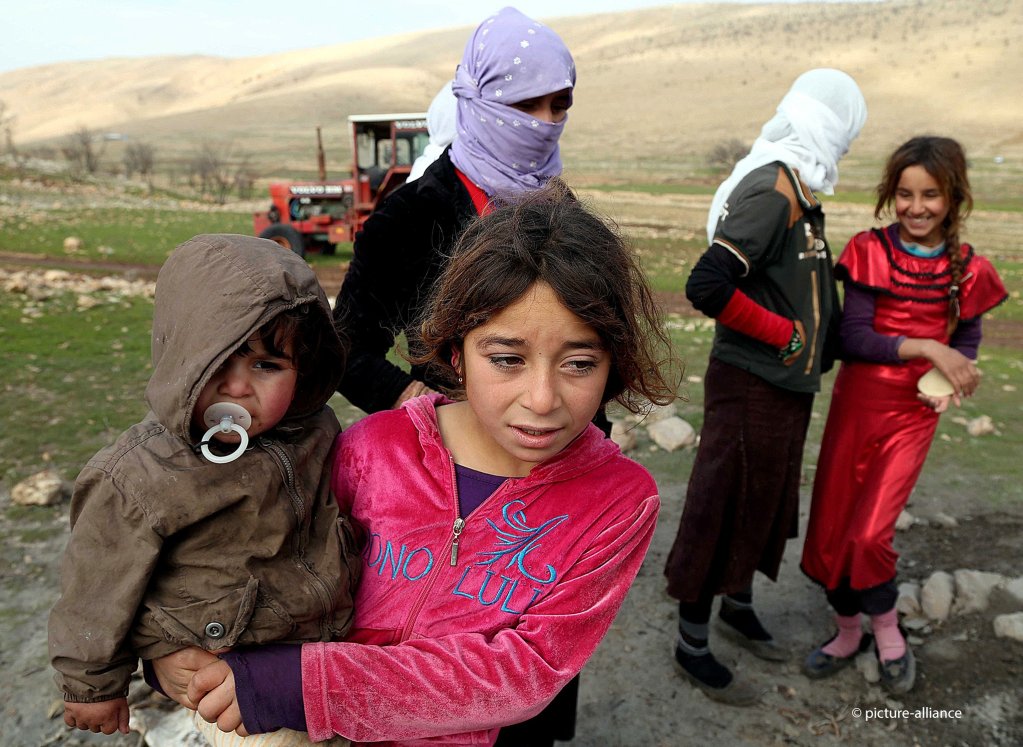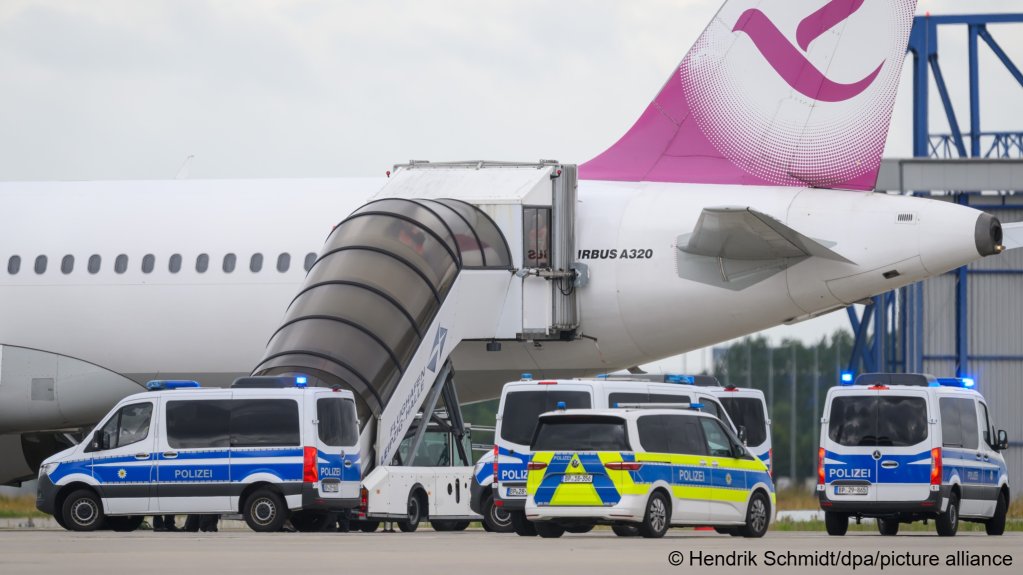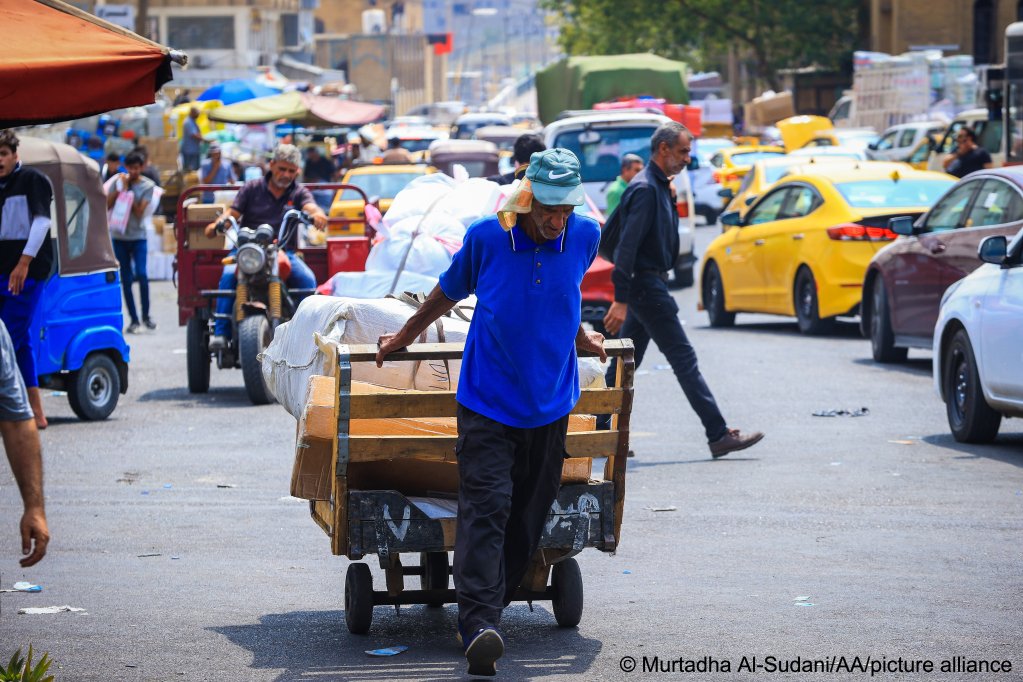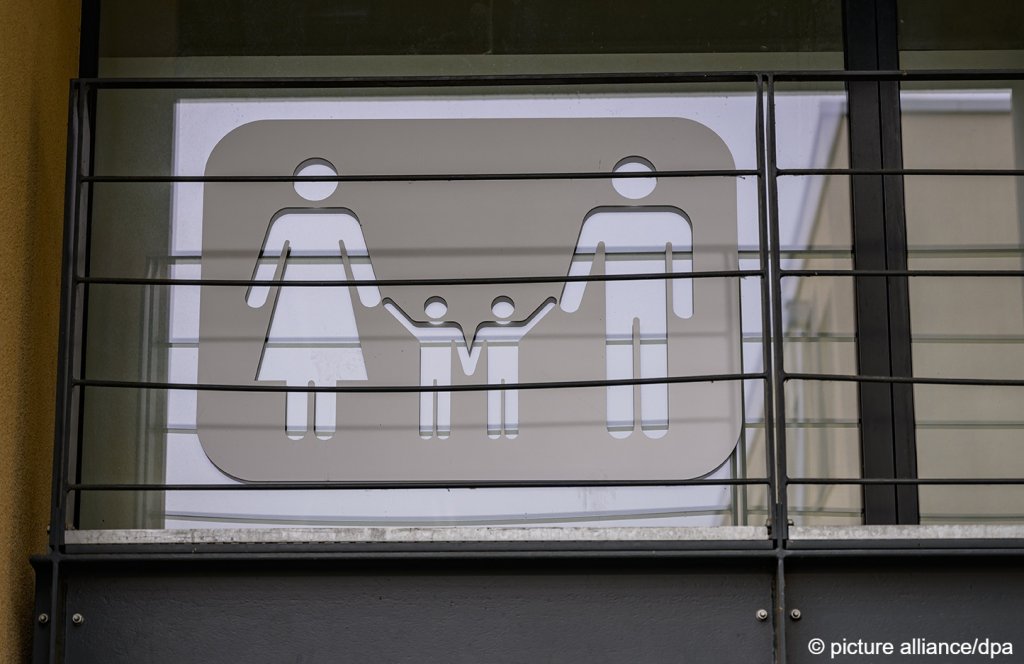A six-person Yazidi family were among those on board a deportation flight that took off from Germany on Tuesday morning. A few hours after the flight departed, a Berlin court overturned a decision that forced the family to leave the country.
Four children, reportedly aged five, 12, 15 and 17 years of age, and their two parents were on board a deportation flight that took off from Leipzig airport in eastern Germany on Tuesday (July 22). The flight transported 43 people from Leipzig to the Iraqi capital Baghdad.
According to a two-part documentary by the German regional public broadcaster Rundfunk Berlin-Brandenburg (RBB), the Qassim family, who are Yazidis from northern Iraq, arrived in Germany in 2022 and were classified as "economic migrants," and so their asylum claims were refused. Since 2023, they have been living in fear of deportation, which eventually took place on Tuesday, despite their appeals.
The details came to light on Wednesday (July 23) after a spokesperson from the Brandenburg Ministry of the Interior confirmed the family was indeed on board the flight. Originally, it had been reported that there were only single men on board.
Read AlsoYazidis continue hunger strike and protest in Berlin
'Survivors' of genocide
According to reports in Germany’s public broadcaster ARD’s news program Tagesschau, the family are "survivors" of the attack on the Yazidi community by the terror militia group known as Islamic State (IS). In 2023, the German parliament declared that what the terror group did to the Yazidi community in 2014 could be recognized as a genocide.
In 2014, IS killed around 5,000 members of the Yazidi community in Iraq; many more were kidnapped and treated as slaves and often sexually abused.

The flight took off on Tuesday morning and just a few hours later, an Administrative Court in Potsdam overturned the decision that the family had to leave the country, reported RBB.
Read AlsoProtection rate of Iraqi Yazidis in Germany falling
Urgent appeal
According to RBB, the family of six had been living in Lychen, north of Berlin -- in an area known as the Uckermark -- since 2022. They had appealed the rejection of their asylum application and a threat to deport them in 2023. In April 2025, a court heard their appeal for international protection, but according to the German press agency dpa, a decision has not yet been forthcoming.
However, based on the 2023 decision, Germany’s Federal Office for Refugees and Migration (BAMF) decided that their claim for international protection was unfounded and rejected their application. They were then asked to leave the country within a week.

On Tuesday, an urgent application was filed with the Potsdam Administrative court to try and change the April decision, but by the time the court had ruled that decision could be overturned, the family and the rest of the plane’s occupants were already airborne.
The court, reported Tagesschau, said it had doubts about the legitimacy of the 2023 decision and said that no concrete reasons had been given for the decision to refuse the family asylum. According to the broadcaster, the family had also brought additional documents and information to the authorities to help them substantiate their claim.
Read AlsoGerman parliament recognizes Yazidi 'genocide' in Iraq
'We are scared'
Germany’s Justice Minister Beate Meißner from the conservative CDU party said about those on board the flight, "our message is clear: Whoever doesn’t have the right to stay in Germany, must leave the country."
According to a report on RBB, the family are now in Baghdad. An RBB reporter got a voice message from one of the family’s children, 12-year-old Maatz, who said "we are scared." Maatz told the reporter that the family were woken up as they slept ahead of their flight by police officers. The police "shouted loudly and shone torches in our faces," Maatz claimed.

A spokesperson for the Brandenburg Interior Ministry told RBB that they had all received papers telling them they had to leave Germany. According to the spokesperson, just before the flight, officials from BAMF met to see if there was any reason why the family shouldn’t be on the flight, but they decided that the deportation could go ahead.
The family was featured in a two-part podcast on RBB, where they talked about fleeing to the mountains of Sinjar after ISIS attacked their community. They said they spent days without food or water, and when they eventually returned to their home, they found it had been destroyed by ISIS. After that, they lived in a refugee camp for a year. "You can’t send us back to the country where that took place," Faheema, the mother, told RBB.
Read AlsoGerman Parliament: IS atrocities against Yazidis were genocide
Integration efforts
When asked about the family’s efforts to integrate in Germany, an official from BAMF told RBB that "although integration efforts are great, they cannot outweigh other considerations. We grant protection when we can see that someone would be in danger if we did otherwise, and they would be threatened if forced to return to their country."
In the RBB documentary, BAMF confirmed that it believed that the family had fled Iraq on economic grounds and not to seek protection. However, RBB said when they tried to follow up with BAMF and talk specifically about the family and the reasons why they might have been classified as economic migrants, they were refused.
According to RBB, all four children attended school and kindergarten, sports clubs, and none of them had been convicted of any crime. Some parents at the children’s school expressed shock and surprise at the news.
Tanja Niclas, a mother of one of Maatz' classmates, said "The family was well integrated and enriched our community. We just can’t understand why they have been deported."
Read AlsoHow Iraq's IDP camps have empowered Yazidi women

Read AlsoKurdish community in Iraq says suicides on the rise
Lawyer applies for the family to be returned
Kareba Hagemann is the family’s lawyer. According to RBB, she is now applying for the family to be brought back to Germany, using the Potsdam court’s decision as the reason.
"This family survived a genocide, and I see that Germany has a moral responsibility to protect survivors of genocide, especially since it was recognized as such by the German parliament." In the documentary, Hagemann commented that she believed it was very cynical of BAMF to “classify people who survived genocide as economic migrants."
A Green party politician and spokesperson on the subject of human rights in the German Parliament, Max Lucks, echoed that sentiment, telling the magazine Focus: "Germany must bring this Yazidi family back." Lucks also called for the President of BAMF, Hans-Eckhard Sommer, to resign over the case.
Read AlsoYazidi refugees in Germany suffer severely from 2014 genocide, study says
Sanctuary in Germany
The migrant rights association Pro Asyl said on Wednesday (July 23), "people who have been the victim of genocide must be able to seek sanctuary in Germany and shouldn’t be returned to the country where that genocide took place."
In 2024, some German states put a ban on the deportation of Yazidis, even if they had had an asylum claim rejected, however, the state of Brandenburg is not one of them.
Pro Asyl added that Germany should have a federal stop on the deportations of Yazidis. Others have been campaigning for a ban on deportations of Yazidis from Germany, too, including the German-Yazidi journalist Düzen Tekkal, who has posted several times on X about the family and their plight.
In a thread, posted on July 24, Tekkal said that ten years after the genocide "Iraq is still not a safe place for Yazidis. Their home region is destroyed and they still face discrimination, persecution and expulsion in Iraq. For many, the genocide didn't stop. For Yazidis, Iraq is unlivable."
In the documentary, Saeed Qassim, the father of the family, told RBB, "We Yazidis see Germany as our second home. And now they are telling us we are no longer welcome in Germany?" Germany hosts the most populous Yazidi community outside of Iraq. Most of them arrived directly after the IS attacks in 2014.
Read AlsoGermany turning away more Yazidi refugees
Returns to Iraq
According to RBB, the German state of Brandenburg has contributed almost 500,000 euros to helping Yazidis in Iraq. At least 72 members of the community live in Brandenburg.
In January 2025, RBB visited the village where the Qassim family used to live. Much of the area is still in ruins, RBB reported. Most of the Yazidi villages around there have not been rebuilt. Hundreds of thousands of Yazidis in the area still live in displacement camps in northern Iraq.
The area from where the family comes is, according to RBB, still being fought over. Both Turkey and Iran fly drones in the area. There are other armed militias patrolling the region too, including members of the Kurdish PKK, which both Europe and Turkey have classed as a terror organization.
For years, Germany tended to only send convicted criminals back to Iraq. But since 2023, when Germany signed agreements with Iraq, the authorities have been able to send more and more Iraqis back who have no right to remain in Germany. Last year, RBB said 916 Iraqi nationals were deported, some of them were Yazidis.
At the end of the documentary, Saeed Qassim tells the listeners: "We want to integrate here in Germany," explained Saeed Qassim, "and to learn German as best we can, so that we can find a job and support ourselves."
He vowed then to do everything he could to fight a possible deportation and obtain the right to stay in Germany. A decision in the family’s case, following their hearing in April, is expected at the end of July.
With dpa
Read AlsoWho are the Yazidis?
